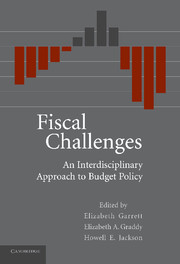Book contents
- Frontmatter
- Contents
- Preface
- Contributors
- PART ONE THE LAW AND POLITICS OF FISCAL POLICY
- PART TWO UNDERSTANDING FEDERAL DEFICITS AND PUBLIC DEBT
- PART THREE BUDGETING AND FISCAL CONSTRAINTS AT THE STATE LEVEL
- PART FOUR INTERGOVERNMENTAL ASPECTS OF BUDGET POLICY
- PART FIVE JUDICIAL POWERS AND BUDGET POLICY
- Index
PART ONE - THE LAW AND POLITICS OF FISCAL POLICY
Published online by Cambridge University Press: 23 December 2009
- Frontmatter
- Contents
- Preface
- Contributors
- PART ONE THE LAW AND POLITICS OF FISCAL POLICY
- PART TWO UNDERSTANDING FEDERAL DEFICITS AND PUBLIC DEBT
- PART THREE BUDGETING AND FISCAL CONSTRAINTS AT THE STATE LEVEL
- PART FOUR INTERGOVERNMENTAL ASPECTS OF BUDGET POLICY
- PART FIVE JUDICIAL POWERS AND BUDGET POLICY
- Index
Summary
The United States Constitution places the power of the purse in the legislature's domain: Article I, §9, cl. 7 specifies that “No Money shall be drawn from the Treasury, but in Consequence of Appropriations made by Law.” Thus, the founders entrusted the federal government's most important power to the most politically accountable branch, the U.S. Congress. Congress not only sets the amount of money appropriated to executive branch agencies and other government activities, but it also directs how that total is to be spent by enacting directives in appropriations laws. Congress has not always handled its budgetary authority responsibly, which can result in an abdication of its power to the executive branch. In some cases, legislators fail to meet constitutional obligations because they wish to avoid blame for potentially unpopular decisions; in other cases, congressional inaction may be due to collective action problems inherent in entities made up of many individuals often pursuing different objectives.
In Chapter 1, William Dauster describes the evolution of the congressional budget process with a particular emphasis on the modern era, beginning with the adoption of the Congressional Budget and Impoundment Control Act of 1974. He describes what has been called the “fiscal Constitution” because of its importance in the American political process. Over the past 30 years, Congress has adopted a series of institutional reforms, including enactment of framework laws that structure the deliberative process in committees and on the floor and creation of the Congressional Budget Office to provide lawmakers more professional expertise.
- Type
- Chapter
- Information
- Fiscal ChallengesAn Interdisciplinary Approach to Budget Policy, pp. 1 - 3Publisher: Cambridge University PressPrint publication year: 2008

